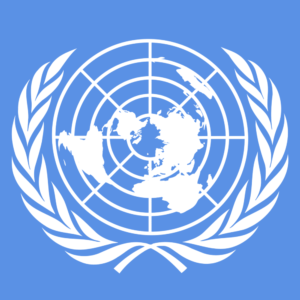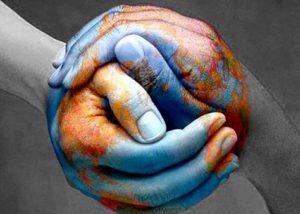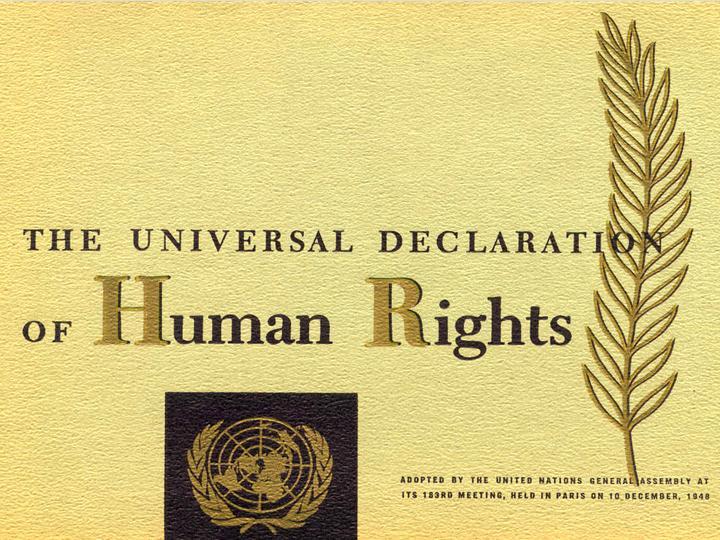The Universal Declaration of Human Rights (UDHR) was mainly drafted by the colonial powers thus voices of third world countries could not be heard in the noble document since they were under the colonial rule. Thus, UDHR which is the soul of human rights served western political agenda excluded hungry and poor of the World. Even authority to code, frame, interpret and enforce UN international law to some extent is with Western power who calls the shots within UN system, analyses Amit, our Editor-at-Large (Europe), in this erudite critique, exclusively for Different Truths.
Long ago a political game started somewhere in Europe called ‘human rights’. Now, we see omnipresence of this game, from the power corridor of the United Nations to dusty streets in India and Africa. Interestingly, small players of this game, such as small-time NGO and civil society members work under the illusion of helping ordinary people without knowing whose interest they are actually serving and what for. This is a common tragedy of the truth, if not millions, thousands of NGO workers in the third world countries.
In this context, Professor Shivaji stresses, “The language of rights is deployed to articulate the most pressing concerns of the large majority of people while at the same time providing the language of resistance against, and changing of, the existing conditions. It is important, therefore, that activist NGOs and other human rights advocates are conscious of the different perspectives on human rights, so that they know what to promote, in whose interest and in which direction.”
Human rights have a western origin, is west-centric, have been driven by the values and ideals that emanate from European renaissance thus universalising the ideas, such as objectivity, morality, and neutrality – in an innate Western sense. Let’s not forget that sense of justice and dignity is common to all religions. However, the discourse of modern human rights with its legal mechanism and obligatory tone is Western. And this is where West controls the rest. Thus, human rights, which was once discourse of social emancipation (Boaventura Santos, 2002) and transcended national boundaries to become the aspiration of humankind as Samul Moyn (2010), has become moral imperialism (Rorty) of our time.
 It is to be noted, Universal Declaration of Human Rights (UDHR) was mainly drafted by the colonial powers thus voices of third world countries could not be heard in the noble document since they were under the colonial rule. Thus, UDHR which is the soul of human rights served western political agenda excluded hungry and poor of the World. Even authority to code, frame, interpret and enforce UN international law to some extent is with Western power who calls the shots within UN system. However, we must not forget that human right has also been the site of social resistance, a site for the struggle for people’s power – be it labour rights or struggle for women’s rights.
It is to be noted, Universal Declaration of Human Rights (UDHR) was mainly drafted by the colonial powers thus voices of third world countries could not be heard in the noble document since they were under the colonial rule. Thus, UDHR which is the soul of human rights served western political agenda excluded hungry and poor of the World. Even authority to code, frame, interpret and enforce UN international law to some extent is with Western power who calls the shots within UN system. However, we must not forget that human right has also been the site of social resistance, a site for the struggle for people’s power – be it labour rights or struggle for women’s rights.
Wherever there are oppression and injustice, there is bound to be resistance and struggle. In this process, the oppressors justify and rationalise their oppression in ideologies of domination, just as the oppressed mobilise and articulate their resistance in the ideologies of struggle and resistance. In the present era, as globalisation is touted as the universal human good, we are also witnessing unprecedented inequalities, injustices, oppression, and levels of poverty and deprivation, which make a mockery of our basic humanity, let alone human rights (Issa Shivji).
The richest 225 people in the world have a combined wealth equal to the annual income of almost half the population of the earth; 1.2 billion of humanity wallows in subhuman existence at less than US$1 a day (Human Rights Development Report 2002) when less than 4 percent of the wealth of the richest 225 people would be sufficient to pay the additional costs to achieve and maintain universal access to basic education, health care, maternity care, adequate food, safe water and sanitation for the whole human race. “Every year about 11 million children die of preventable causes, often for want of simple and easily provided improvements in nutrition, sanitation, maternal health, and education.” (Human Rights Development Report 2002)
Reconceptualising Human Rights
It is within this wider socio-economic context we need to reconstruct and reconceptualise human rights discourse so that common people’ rights and struggle can be prioritised. In the context of the rising national liberation movements and new forms of imperial domination, a number of liberation movements, trade unions and activist intellectuals meeting in Algiers in 1976 adopted the Universal Declaration of the Rights of Peoples (Algiers Declaration). The Algiers Declaration is a fine example of the reconceptualization of the ideology of the right by civil society to legitimise the struggle of peoples. The Algiers Declaration sums up people’s struggles so as to legitimise them.
Universal Declaration of the Rights of Peoples (Algiers, 4 July 1976)
Preamble
We live at a time of great hopes and deep despair; a time of conflicts and contradictions; a time when liberation struggles have succeeded in arousing the peoples of the world against the domestic and international structures of imperialism and in overturning colonial systems; a time of struggle and victory in which new ideals of justice among and within nations have been adopted; a time when the General Assembly of the United Nations has given increasing expression, from the Universal Declaration of Human Rights to the Charter on the Economic Rights and Duties of States, to the quest for a new international, political and economic order.
But this is also a time of frustration and defeat, as new forms of imperialism evolve to oppress and exploit the peoples of the world. Imperialism, using vicious methods, with the complicity of governments that it has itself often installed, continues to dominate a part of the world. Through direct or indirect  intervention, through multinational enterprises, through manipulation of corrupt local politicians, with the assistance of military regimes based on police repression, torture and physical extermination of opponents, through a set of practices that have become known as neo-colonialism, imperialism extends its stranglehold over many peoples.
intervention, through multinational enterprises, through manipulation of corrupt local politicians, with the assistance of military regimes based on police repression, torture and physical extermination of opponents, through a set of practices that have become known as neo-colonialism, imperialism extends its stranglehold over many peoples.
Aware of expressing the aspirations of our era, we met in Algiers to proclaim that all the peoples of the world have an equal right to liberty, the right to free themselves from any foreign interference and to choose their own government, the right if they are under subjection, to fight for their liberation and the right to benefit from other peoples’ assistance in their struggle.
Convinced that the effective respect for human rights necessarily implies respect for the rights of peoples, we have adopted the Universal Declaration for the Rights of Peoples.
May all those who, throughout the world, are fighting the great battle, at times through armed struggle, for the freedom of all peoples, find in this Declaration the assurance of the legitimacy of their struggle.
Section I: Right to Existence
Article 1
Every people has the right to existence.
Article 2
Every people has the right to the respect of its national and cultural identity.
Article 3
Every people has the right to retain peaceful possession of its territory and to return to it if it is expelled.
Article 4
None shall be subjected, because of his national or cultural identity, to massacre, torture, persecution, deportation, expulsion or living conditions such as may compromise the identity or integrity of the people to which he belongs.
Section II: Right to Political Self-determination
Article 5
Every people has an imprescriptible and unalienable right to self-determination. It shall determine its political status freely and without any foreign interference.
Article 6
Every people has the right to break free from any colonial or foreign domination, whether direct or indirect and from any racist regime.
Article 7
Every people has the right to have a democratic government representing all the citizens without distinction as to race, sex, belief or colour, and capable of ensuring effective respect for the human rights and fundamental freedoms for all.
Section III: Economic Rights of Peoples
Article 8
Every people have an exclusive right over its natural wealth and resources. It has the right to recover them if they have been despoiled, as well as any unjustly paid indemnities.
Article 9
Scientific and technical progress being part of the common heritage of mankind, every people has the right to participate in it.
Article 10
Every people has the right to a fair evaluation of its labour and to equal and just terms in international trade.
Article 11
Every people has the right to choose its own economic and social system and pursue its own path to economic development freely and without any foreign interference.
Article 12
The economic rights set forth shall be exercised in a spirit of solidarity amongst the peoples of the world and with due regard for their respective interests.
Section IV: Right to Culture
Article 13
Every people has the right to speak its own language and preserve and develop its own culture, thereby contributing to the enrichment of the culture of mankind.
Article 14
Every people has the right to its artistic, historical and cultural wealth.
Article 15
Every people has the right not to have an alien culture imposed upon it.
Section V: Right to Environment and Common Resources
Article 16
Every people has the right to the conservation, protection, and improvement of its environment.
Article 17
Every people has the right to make use of the common heritage of mankind, such as the high seas, the seabed, and outer space.
Article 18
In the exercise of the preceding rights, every people shall take account of the necessity for coordinating the requirements of its economic development with solidarity amongst all the peoples of the world.
Section VI: Rights of Minorities
Article 19
When a people constitute a minority within a State it has the right to respect for its identity, traditions, language and cultural heritage.
Article 20
The members of a minority shall enjoy without discrimination the same rights as the other citizens of the State and shall participate on an equal footing with them in public life.
Article 12
The economic rights set forth shall be exercised in a spirit of solidarity amongst the peoples of the world and with due regard for their respective interests.
Section IV: Right to Culture
Article 13
Every people has the right to speak its own language and preserve and develop its own culture, thereby contributing to the enrichment of the culture of mankind.
Article 14
Every people has the right to its artistic, historical and cultural wealth.
Article 15
Every people has the right not to have an alien culture imposed upon it.
Section V: Right to Environment and Common Resources
Article 16
Every people has the right to the conservation, protection, and improvement of its environment.
Article 17
Every people has the right to make use of the common heritage of mankind, such as the high seas, the seabed, and outer space.
Article 18
In the exercise of the preceding rights, every people shall take account of the necessity for coordinating the requirements of its economic development with solidarity amongst all the peoples of the world.
Section VI: Rights of Minorities
Article 19
When a people constitute a minority within a State it has the right to respect for its identity, traditions, language and cultural heritage.
Article 20
The members of a minority shall enjoy without discrimination the same rights as the other citizens of the State and shall participate on an equal footing with them in public life.
Article 21
These rights shall be exercised with due respect for the legitimate interests of the community as a whole and cannot authorise impairing the territorial integrity and political unity of the State provided the State acts in accordance with all the principles set forth in this Declaration.
Section VII: Guarantees and Sanctions
Article 22
Any disregard for the provisions of this Declaration constitutes a breach of obligations towards the international community as a whole.
Article 23
Any prejudice resulting from disregard for this Declaration must be totally compensated by whoever caused it.
Article 24
Any enrichment to the detriment of the people in violation of the provisions of this Declaration shall give rise to the restitution of profits thus obtained. The same shall be applied to all excessive profits on investments of foreign origin.
Article 25
Any unequal treaties, agreements or contracts concluded in disregard of the fundamental rights or peoples shall have no effect.
Article 26
External financial charges which become excessive and unbearable for the people shall cease to be due.
Article 27
The gravest violations of the fundamental rights of peoples, especially of their right to existence, constitute international crimes for which their perpetrators shall carry personal penal liability.
Article 28
Any people whose fundamental rights are seriously disregarded has the right to enforce them, especially by political or trade union struggle and even, in the last resort, by the use of force.
Article 29
Liberation movements shall have access to international organisations and their combatants are entitled to the protection of the humanitarian law of war.
Article 30
The re-establishment of the fundamental rights of peoples, when they are seriously disregarded, is a duty incumbent upon all members of the international community.
References
Santos, Boaventura de Sousa (2002). “Toward a Multicultural Conception of Human Rights,” in Hernández-Truyol, Berta (org.), Moral Imperialism: A Critical Anthology. New York: New York University Press, p. 39-60.
Shivji, Issa G. “Perspectives on Human Rights – An Introduction.” Accessed in: rightstraining.fahamu.org/ocw/learning-for-change/introduction-to-human– rights/content/pdf
Moyn, Samuel (2010), “Humanity before Human Rights”, The last utopia: human rights in history. Cambridge, Mass.: Belknap Press of Harvard University Press, 11-43.
©Amit Singh
Photos from the Internet
#CoverStory #HumanRights #History #WesternPower #UniversalDeclarationOfHumanRights #UN #DifferentTruths






 By
By
 By
By
 By
By